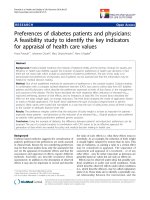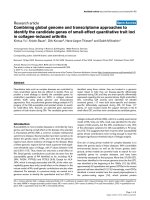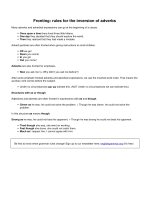Identify the adverbs
Bạn đang xem bản rút gọn của tài liệu. Xem và tải ngay bản đầy đủ của tài liệu tại đây (8.15 KB, 1 trang )
Identify the adverbs
Adverbs
are words used to modify verbs. Most of them end in
–ly.
Place words and time words are all adverbs.
Adverbs may also modify
adjectives
or other adverbs. An adverb that modifies an adjective or another adverb
usually goes before that adjective or adverb.
Underline the adverbs in the following sentences.
1. She sings well.
2. The coffee is very hot.
3. Kiran is an extremely good dancer.
4. It is too hot today.
5. She speaks all foreign languages fluently.
6. The child is now happy.
7. He learns his lessons very carefully.
8. I visit my friend daily.
9. I will return immediately.
10. I hardly recognized my old friend.
Answers
1. She sings well. (Here the adverb ‘well’ modifies the verb ‘sings’.)
2. The coffee is very hot. (Here the adverb ‘very’ modifies the adjective ‘hot’.)
3. Kiran is an extremely good dancer. (Here the adverb ‘extremely’ modifies the adjective ‘good’.)
4. It is too hot today. (Here the adverb ‘too’ modifies the adjective ‘hot’. The word ‘today’ is also an adverb.)
5. She speaks all foreign languages fluently. (Here the adverb ‘fluently’ modifies the verb ‘speaks’.)
6. The child is now happy. (Here the adverb ‘now’ modifies the adjective ‘happy’.)
7. He learns his lessons very carefully. (Here the adverb ‘very’ modifies another adverb – carefully.)
8. I visit my friend daily. (Here the adverb ‘daily’ modifies the verb ‘visit’.)
9. I will return immediately. (Here the adverb ‘immediately’ modifies the verb ‘return’.)
10. I hardly recognized my old friend. (Here the adverb ‘hardly’ modifies the verb ‘recognized’.)
Be first to know when grammar rules change! Sign up to our newsletter here: englishgrammar.org (It's free)
Powered by TCPDF (www.tcpdf.org)









